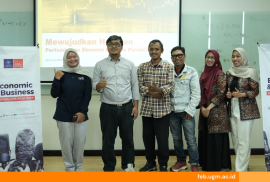Subsidized fuel oil (BBM) which amounted to 193.8 trillion spent by the government in 2013 certainly will not be on target. Subsidies to be used by public transportation, motor vehicles and fishermen. In contrast, the subsidy is more widely used by
economic groups that families are able to have a luxury vehicle. Therefore, it is proposed that the government to immediately raise fuel prices gradually, pairing Single Identity Number (SIN) by E-KTP in oil marketing, accelerate the conversion of fuel oil to fuel gas (BBG) and increasing source of oil and gas production. The issue in discussions experts with topic Fuel Subsidy Policy and the National Economy held in Pertamina Tower, Faculty of Economics and Business (FEB) UGM, on Saturday (23/2).
Rimawan Pradiptyo, M.Sc., Ph.D., Researcher of Fuel Subsidy Policy Faculty said the pattern of consumption of subsidized fuel consumption in Indonesia is compensated. This phenomenon is like a parent giving his credit card to the “ABG” (teenagers) and the child is released to buy any item in a luxury mall and the parents will pay any consumption by the child.
However, the lower the fuel subsidy allocations to minimize the negative impact of these policies to the income of poor households are even more difficult to achieve in Indonesia, given the absence of Single Identity Number (SIN) in the marketing of the fuel so that there is no discrimination between the price of subsidized fuel and non-fuel subsidies. “It’s the choice we face together associated with the fuel subsidy is not a choice between good and bad, but rather a choice between bad and awful”, said Rimawan.
The Center for Budget Policy, Fiscal Policy, Ministry of Finance, Rofyanto Kurniawan, ST, MBA, said fuel subsidy allocations from year to year so it is always increasing burden the state budget. He said from 2011, reaching 129 trillion fuel subsidy, then increased to 165 trillion in 2012. “Government subsidies amounted to 23 trillion in 2012 alone has not been paid,” he said.
Member of Commission VII and Budget Committee of the House of Representative, Ir. Isma Yatun, MT, explaining the government is judged difficulty monitoring the use of subsidized fuel restriction. Even the government to target government and corporate vehicles are not consuming countries. Subsidized fuel is not reached. “In Java and Bali, from the target of 80 per cent of vehicles only 23 percent are achieved, not to mention other areas,” he said.
Options to increase fuel prices by Isma Yatun be a tough choice for the government. Even if the government raised the price in accordance with the international price of the fuel price would be Rp 9,000 per liter. “Will the government dare to raise up economical price?,” He said.
Nevertheless he advised the government to undertake measures to reduce fuel subsidies so that subsidies are gradually reaching 2.1 of GDP can be transferred to improve economic growth, health, and reduce the number of poor people.
Sources: Gusti/UGM




